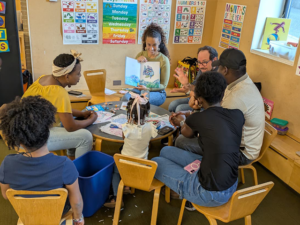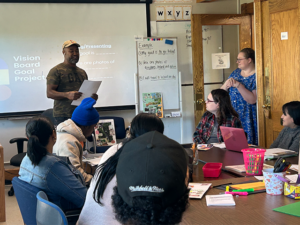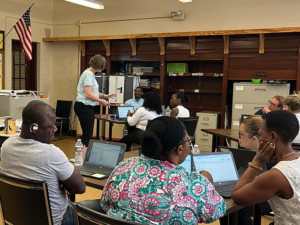Summer: A Time for…Learning?
Written by Annie Sferrazza, First Literacy Program Director

Parents and children building literacy skills together at JVS.
We often associate summer with extra sunshine, beach days, and a time to relax and recharge, but for the adult learners participating in three of First Literacy’s 2025-2026 grant funded programs, summer was a time to get ahead.
Each year, the topic of children’s summer regression pops up in the news, but we often don’t associate it with adult learners, though the effect of starting and stopping learning is just as detrimental. For many adult learners, the opportunity to continue their studies in the summer is not a possibility.
Research from the Adult Literacy & Learning Impact Network (ALL IN), has shown that lack of time inhibits a lot of adult learners from pursuing education that will further their literacy skills. Additionally, long wait lists for adult basic education (ABE) and English for speakers of other languages (ESOL) programs make it even harder for adults who are seeking to learn. According to ProLiteracy, 51% of adult literacy programs report putting students on a waiting list due to demand exceeding program capacity.
The great thing about summer is that it offers a bit more time and flexibility – coupled with the right funding and tools – the summer months are a great time for adult learners to participate in new programs that will help them continue to advance their skills.
First Literacy grants offer non-profit ABE and ESOL organizations an avenue to explore programs that traditional funding, like the Department of Elementary and Secondary Education (DESE), will not cover due to uncertainty and funds. Because of this, First Literacy grant recipients have the flexibility to pilot new programs and offer new solutions to a lot of unmet needs.
The 2025 summer grant recipient programs did not necessarily seek to combat learning regression, rather, increase learning, and the effects were all positive. Each organization used the summer as an opportunity to focus on developing and building literacy skills.
Building Literacy Skills as a Family
JVS in Hyde Park piloted a virtual, “Summer Family Literacy” program, which sought to build both literacy skills for parents (and sometimes grandparents!) and children. Most of the students enrolled had been a part of JVS for at least the previous year but wanted to work on their own literacy skills and instill that value in their children. Not only did the adults increase their literacy skills in English, but they increased their skills in their first languages, as well, and were given the tools and support needed to build better reading habits with their children.
Dave Bufano, one of the instructors for the program, noted that homework improved drastically. While there were no formal assessments, each week, the adults were asked to record themselves reading to their children. At first, the recordings were difficult to understand due to pronunciation issues, but by the end of the course, there was a vast improvement – each recording was clear and easy to understand.
Learning Is Worth the Wait

Students in the Jump Start ESOL Program at Community Action, Inc., share their goals using the present and future tenses.
Community Action, Inc., located in Haverhill, took a different route with their summer program: none of the adult learners enrolled had previously attended classes at the school. With a waitlist of over 200 students, Erin Paszko, Director of Adult Education, wanted to use the summer program, “Jump Start ESOL” to give beginner English language learners who have been waiting the longest a chance to take a course before the fall.
One student described the course as “sensational,” and praised their instructor. All students agreed that their English improved during the six-week program, and all felt more comfortable speaking English outside of school. The students were also able to form a tightknit bond and were excited and ready to start their fall English courses.
The course was also used as an opportunity for students to develop leadership skills – using more advanced English speakers as embedded tutors to work with and tutor the students in the course. The tutors were both surprised and impressed with themselves – both at what they knew and how much they themselves learned throughout the process.
The Impact of Digital Literacy
Blue Hills Adult Education in Canton developed a program called “Digital Literacy for the Future”. The program aimed to build digital skills in adult learners, and in turn, helped build English language skills. The program’s instructor, Amy Enright, described the program as a “straight up two-fer – yes, they are practicing English and learning domain-specific vocabulary that’s professionally crucial, and socially crucial, as well.”

Students in the Digital Literacy class at Blue Hills Adult Education learn how to use the Shift key for question marks, exclamation points, capitalization, and more.
Many students – not just at Blue Hills Adult Education but at all ABE and ESOL organizations – are at a loss when it comes to digital literacy outside of smart phones. For many, laptops and Chromebooks are new, and whether they want to participate in class, help their children with their schoolwork, or get ahead professionally, they need basic computer skills.
Enright used repetition throughout the program, which focused on skills such as how to use a trackpad, using the Shift key, composing an email, and navigating Google Docs. One of the luxuries of this course was having the time needed to focus on digital skills, which unfortunately, cannot be done in a traditional ESOL class. Enright noted, “You can’t focus on the tool while you’re trying to teach vocabulary and civics and grammar – you don’t have time.”
The Power of Summer Learning
Summer learning opportunities are essential for all ages – including adults. Time, experimentation, and flexibility are all intangibles that are not often readily available during the traditional academic year, which is why many ABE and ESOL organizations view summer as a valuable opportunity for adult learners to gain new skills and advance in areas where they may be struggling.
This summer, Community Action Inc., JVS, and Blue Hills Adult Education took advantage of the long summer days and offered new innovative programs that allowed adult learners the chance to make great strides in their learning journeys.
